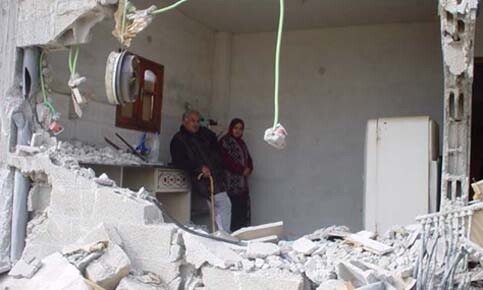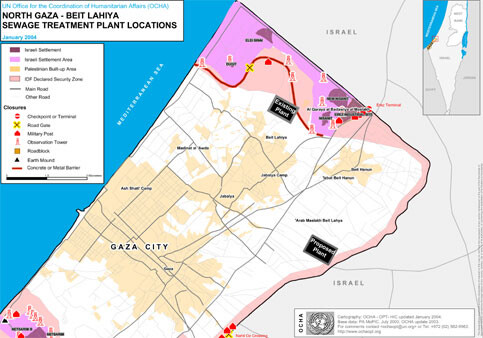UN Office for the Coordination of Humanitarian Affairs 28 January 2004

Palestinian civilians looking out from their kitchen at the destruction to their home (Photo: PCHR, 2004)
The Israeli Defence Forces have carried out a campaign of demolition and land leveling in Rafah, in the southern Gaza strip. During its three most recent incursions, between 16 and 22 January, a 31 year old Palestinian woman was killed and 8 other Palestinians were injured.
Since the beginning of January, the IDF has totally or partially demolished 72 homes making 584 people homeless.
The IDF states that these operations were undertaken following the “discovery of a weapons smuggling tunnel (as well as a tunnel filled with explosives)”. IDF forces “demolished a number of abandoned structures concealing tunnel entry shafts along the Israel-Egypt border, in the Rafah area. The abandoned structures were demolished to halt weapon smuggling and terrorist activity against IDF forces and Israeli civilians.”1
The context: IDF operations in Gaza since October 2000
The result of the house demolitions has been to create a buffer zone that stretches from Rafah passenger terminal in the east down to the Mediterranean coast. It is several kilometers in length and in places up to 200 metres deep. (See map).

Source: Office for the Coordination of Humanitarian Affairs, original map (PDF)
UNRWA calculates that of 14,852 people made homeless since October 2000 by IDF house demolition, two-thirds are from Rafah. In October 2003 alone, the IDF demolished 189 homes in Rafah camp. Fifteen people were killed and 1780 individuals were made homeless in the October operation.

Options for those made homeless by IDF action
Some of those made homeless by IDF operations move into smaller units, which in most cases are insufficient for the size of the family. Others have migrated northwards in search of accommodation, or — in exceptional cases - moved into abandoned dwellings adjacent to the buffer zone that were left by other families fearful that their homes would be targeted.
An increasing number of families whose homes were destroyed are relying on tents for shelter. Tents are being provided by UNRWA and ICRC. In the month from 21 December, the ICRC supplied 243 families in Rafah with tents.
These families are also increasingly dependent on aid agencies for food. Because of growing needs in Rafah, the World Food Programme has increased its programme of assistance to provide food for 5026 families in Rafah, compared with 3472 in August 2003.
UNRWA appeal for immediate assistance
UNRWA will be unable to re-build on the sites where the original homes have been destroyed; and available land is scarce. It has launched an appeal for funds to enable it to build new shelters for homeless refugees in Gaza. Before the latest round of demolitions, UNRWA estimated that it would cost US$25 million to re-house all the refugees who have lost their homes.2
Israeli house demolitions and International Humanitarian Law
A number of international legal provisions are relevant to the recent IDF operation in Gaza:
Proportionality
Under the Fourth Geneva Convention, an occupying power may take measures to protect the security of the area, including limited destruction of property when “rendered absolutely necessary by military operations”. However, Article 147 includes as a grave breach of the Convention “Extensive destruction … not justified by military necessity”.
Articles 51 and 57 of the Convention also prohibit “incidental loss of civilian life, injury to civilians, damage to civilian objects, or a combination thereof, which would be excessive in relation to the concrete and direct military advantage anticipated.”
Peter Hansen, Commissioner General of UNRWA, has described the latest demolitions as “a hugely disproportionate military response”. 3
Prohibition of collective punishment
Article 33 of the Fourth Geneva Convention states that “No protected person may be punished for an offence he or she has not personally committed. Collective penalties and likewise all measures of intimidation … are prohibited … Reprisals against protected persons and their property are prohibited.”
On 22 January, Peter Hansen said that Palestinians affected by the demolition policy could “hardly be blamed if they have come to believe that they are the victims of collective punishment.”
Notes:
1. IDF weekly summary of events, 22 January 2004
2. UNRWA Press Release, 22 January 2004
3. UNRWA Press Release, 22 January 2004size>